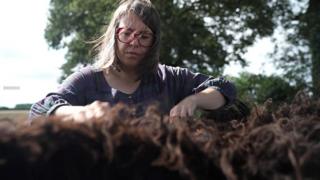Coronavirus: Sheep wool ‘barely worth selling any more’
 Image copyright Rachel Atkinson
Image copyright Rachel Atkinson «I started my company because my dad received approximately 3p per fleece for his Hebridean wool and I thought, ‘We must be able to do better than that,'» says shepherd’s daughter Rachel Atkinson.
Rachel manufactures woollen products, but her firm is struggling.
Wool’s popularity has been in decline since the 1950s – and this year, coronavirus has added problems that businesses can ill afford.
The global wool market closed in February. This has led to vast volumes of wool lying unsold in depots and has pushed prices down.
Most farmers sell their fleeces through British Wool, formerly the British Wool Marketing Board. Some 14 million kg of wool are waiting to be shifted from its stores, while the average price per kg has nearly halved: it is now 32p, compared with 60p the previous year.
Rachel, who is based in Banbury in Oxfordshire, says: «Farmers used to be able to pay a year’s rent from the price of wool, but it’s barely worth selling anymore.»
Some producers are even chucking it away.
«I’m wishing I had more space and more money to buy from the shepherds, who are really suffering with this,» she says.
Thrown out
Gerallt Hughes runs a farm on Anglesey. He has put nearly 600 fleeces on the compost heap.
Each farmer’s costs are different, but in Gerallt’s case, it doesn’t make financial sense selling the wool this year.
«I’m not going to spend 30p on packing [a fleece] to get 24p back,» he said.
He is critical of British Wool and says he thinks the organisation has been over-reliant on the Chinese market.
«What the Wool Board should have been doing is looking for alternative markets for the last 20 years,» he says.
British Wool chief executive Joe Farren says the organisation is «big enough and ugly enough» to take criticism, but that a new strategy to market and sell the product is under way.
Wool produced in the UK is used in products such as carpets, knitwear, soft furnishings and bedding.
«We are a convenient outlet for farmers’ wool,» he says.
«[But] if a farmer wants to put a supply chain together and develop their wool and bring their own product to market, they’re open to do that.»
Andrea Meanwell, a shepherdess in the Howgill Fells, an area that straddles the Lake District and the Yorkshire Dales, says she is storing her sheep’s wool, hoping that next year demand will pick up.
Like Gerallt Hughes, she says the costs of selling the wool this year outweigh the benefits, particularly for remote farms, where transportation costs are higher.
«Lots of people that I know are burning or composting, or just leaving the wool to rot,» she says.
«It’s quite time-consuming to innovate a product yourself. Most farmers just don’t have the time to do that.»
Mr Farren says British Wool is now working «with branded manufacturers to create new consumer demand for the products».
«We’re working hard to address the structural issues in the supply chain,» he says.
Mr Farren is calling on farmers to continue working with British Wool during a «terrible year».
«Please send the wool, let us collect it. If it’s not brought in, it will fall out of use,» he said.
He told the BBC that British Wool had been turned down for the government’s Coronavirus Business Interruption Loan Scheme «on a technicality», but that it needed financial support «to pay our producers this year for next year’s wool».
The reasons for the decline in the price for wool – while exacerbated by Covid-19 – are many. Industry insiders point to the growth in synthetic fibres, fewer players in the industry supply chain, Brexit uncertainty and the US-China trade war.
But before the pandemic, Rachel Atkinson had been optimistic.
«It’s incredibly sad, as the British wool industry had been steadily gaining in value over the past few years,» she says.
Andrea Meanwell says she hopes wool will become popular again with consumers.
«We’re hearing so much now about micro-plastics damaging the environment,» she says, «so farmers have been hoping for a while that there’ll be a return to people using wool.
«But at the moment, it doesn’t seem to have happened.»


